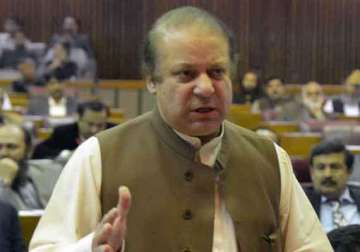Islamabad: With demands for his resignation growing louder, Pakistan Prime Minister Nawaz Sharif has decided to address the nation and the National Assembly today expectedly to take countrymen and lawmakers into confidence.
On Wednesday, the ongoing political crisis took a new turn with Pakistan Awami Tehreek (PAT) chief Tahir-ul-Qadri opening a dialogue with Sharif government. The government's team sent to Qadri included Minister for Frontier Region Qadri Baloch and Minister for Railway Saad Rafique, who was later replaced by Minister for Development Ahsan Iqbal as Qadri had reservations over Rafique's inclusion. Opposition leaders Ijazul Haq and Haidar Abbas Rizvi were also part of the team.
On the other hand, Pakistan Tehreek-e-Insaf (PTI)'s Imran Khan, who was adamant to 'no-talks' position unless the Prime Minister quits, also emerged for negotiations. Reports suggested that a delegation of PTI presented six-point charter of demands before the government which includes Sharif's resignation, mid-term election, electoral reforms, neutral caretaker government, resignation of Election Commission and punishments to those responsible for rigging last year's polls.
"We have decided to negotiate with you Nawaz Sharif, but listen carefully -- the negotiation will start with the resignation of Prime Minister Sharif. How can a probe under Nawaz Sharif be transparent?" Khan said.
"I will not leave this place until Nawaz Sharif resigns," Khan aaded.
The move came after the powerful Army called for calm following the breach by protesters of the high-security ‘Red Zone' that houses important government buildings including the Parliament House, Prime Minister House, President House, the Supreme Court besides the embassies. The military said that buildings in the ‘Red Zone' are symbols of state and being protected by the Army, so the sanctity of these national symbols must be respected.
While Qadri's 'Inqlab March' is for toppling the government for its anti-poor policies and corruption, PTI's ‘Azadi March' is against the electoral fraud in last year's general election which was won by the PML-N.
In 2013 elections, Sharif's PML-N had won 190 out of 342 seats. Khan's PTI got 34 seats, the third largest bloc in the legislature.
The Army, which has so far been passive this time, has a history of capturing power from democratically-elected governments. In its 67-year history, Pakistan has witnessed three coups, including one against Sharif in 1999 by the then Army Chief General Parvez Musharraf.
Latest World News
